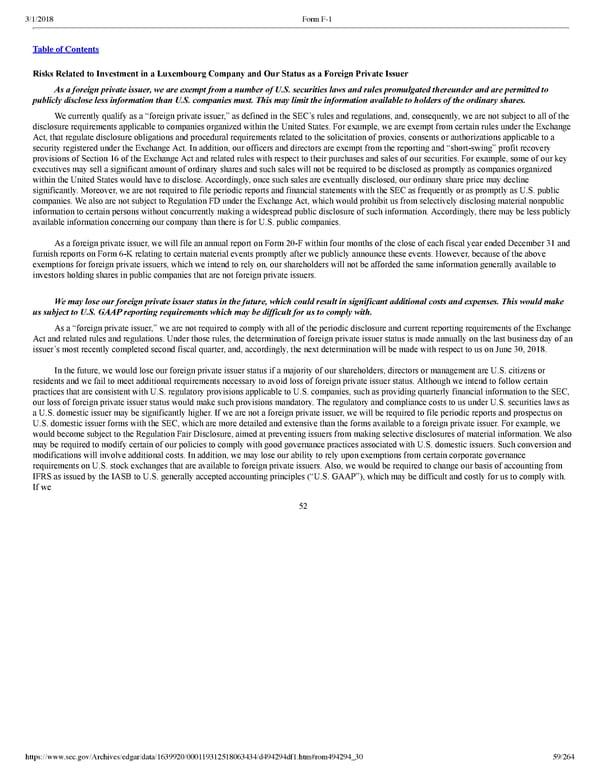59/264 Risks Related to Investment in a Luxembourg Company and Our Status as a Foreign Private Issuer As a foreign private issuer, we are exempt from a number of U.S. securities laws and rules promulgated thereunder and are permitted to publicly disclose less information than U.S. companies must. This may limit the information available to holders of the ordinary shares. We currently qualify as a “foreign private issuer,” as defined in the SEC’s rules and regulations, and, consequently, we are not subject to all of the disclosure requirements applicable to companies organized within the United States. For example, we are exempt from certain rules under the Exchange Act, that regulate disclosure obligations and procedural requirements related to the solicitation of proxies, consents or authorizations applicable to a security registered under the Exchange Act. In addition, our officers and directors are exempt from the reporting and “shortswing” profit recovery provisions of Section 16 of the Exchange Act and related rules with respect to their purchases and sales of our securities. For example, some of our key executives may sell a significant amount of ordinary shares and such sales will not be required to be disclosed as promptly as companies organized within the United States would have to disclose. Accordingly, once such sales are eventually disclosed, our ordinary share price may decline significantly. Moreover, we are not required to file periodic reports and financial statements with the SEC as frequently or as promptly as U.S. public companies. We also are not subject to Regulation FD under the Exchange Act, which would prohibit us from selectively disclosing material nonpublic information to certain persons without concurrently making a widespread public disclosure of such information. Accordingly, there may be less publicly available information concerning our company than there is for U.S. public companies. As a foreign private issuer, we will file an annual report on Form 20F within four months of the close of each fiscal year ended December 31 and furnish reports on Form 6K relating to certain material events promptly after we publicly announce these events. However, because of the above exemptions for foreign private issuers, which we intend to rely on, our shareholders will not be afforded the same information generally available to investors holding shares in public companies that are not foreign private issuers. We may lose our foreign private issuer status in the future, which could result in significant additional costs and expenses. This would make us subject to U.S. GAAP reporting requirements which may be difficult for us to comply with. As a “foreign private issuer,” we are not required to comply with all of the periodic disclosure and current reporting requirements of the Exchange Act and related rules and regulations. Under those rules, the determination of foreign private issuer status is made annually on the last business day of an issuer’s most recently completed second fiscal quarter, and, accordingly, the next determination will be made with respect to us on June 30, 2018. In the future, we would lose our foreign private issuer status if a majority of our shareholders, directors or management are U.S. citizens or residents and we fail to meet additional requirements necessary to avoid loss of foreign private issuer status. Although we intend to follow certain practices that are consistent with U.S. regulatory provisions applicable to U.S. companies, such as providing quarterly financial information to the SEC, our loss of foreign private issuer status would make such provisions mandatory. The regulatory and compliance costs to us under U.S. securities laws as a U.S. domestic issuer may be significantly higher. If we are not a foreign private issuer, we will be required to file periodic reports and prospectus on U.S. domestic issuer forms with the SEC, which are more detailed and extensive than the forms available to a foreign private issuer. For example, we would become subject to the Regulation Fair Disclosure, aimed at preventing issuers from making selective disclosures of material information. We also may be required to modify certain of our policies to comply with good governance practices associated with U.S. domestic issuers. Such conversion and modifications will involve additional costs. In addition, we may lose our ability to rely upon exemptions from certain corporate governance requirements on U.S. stock exchanges that are available to foreign private issuers. Also, we would be required to change our basis of accounting from IFRS as issued by the IASB to U.S. generally accepted accounting principles (“U.S. GAAP”), which may be difficult and costly for us to comply with. If we 52
 Spotify F1 | Interactive Prospectus Page 58 Page 60
Spotify F1 | Interactive Prospectus Page 58 Page 60